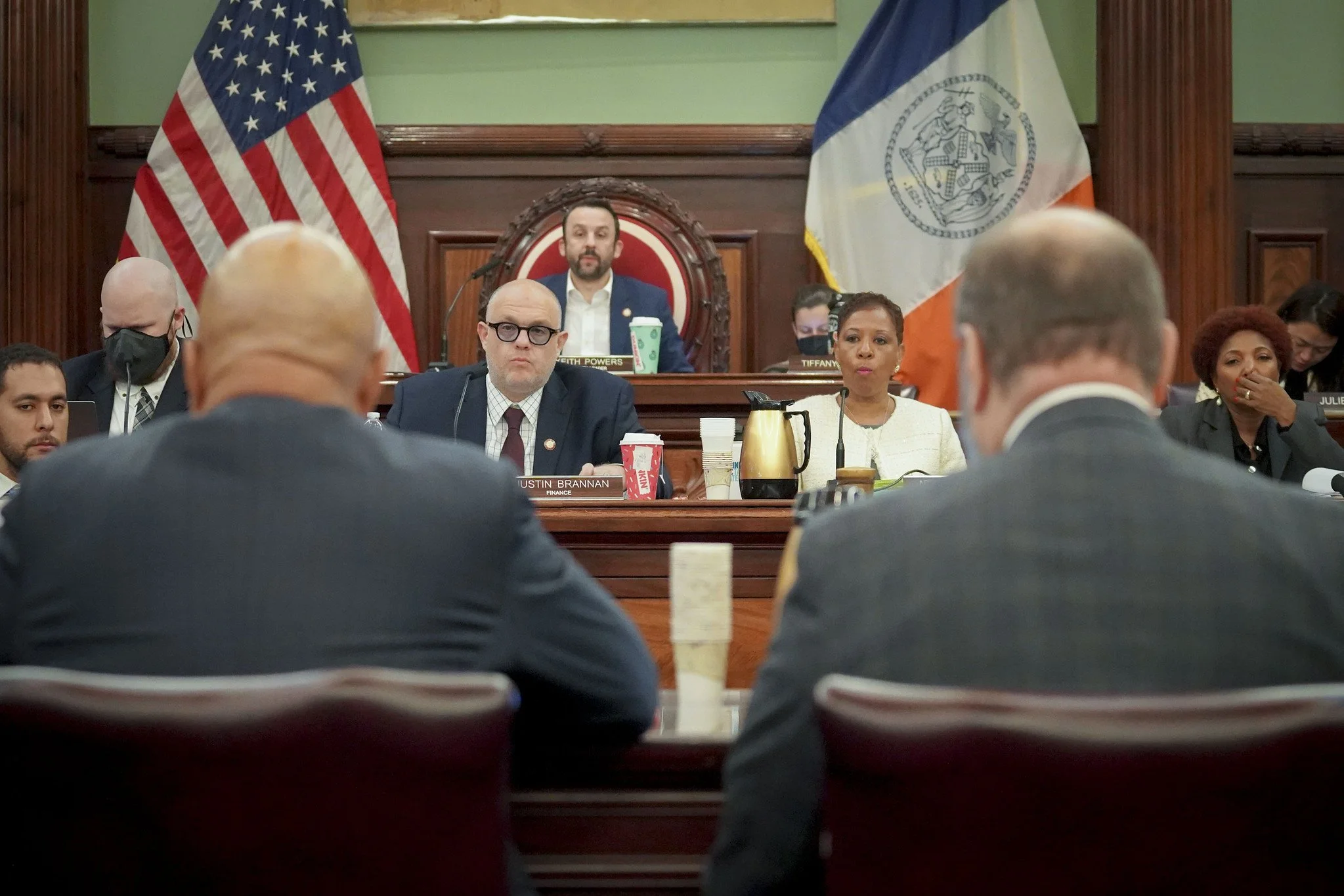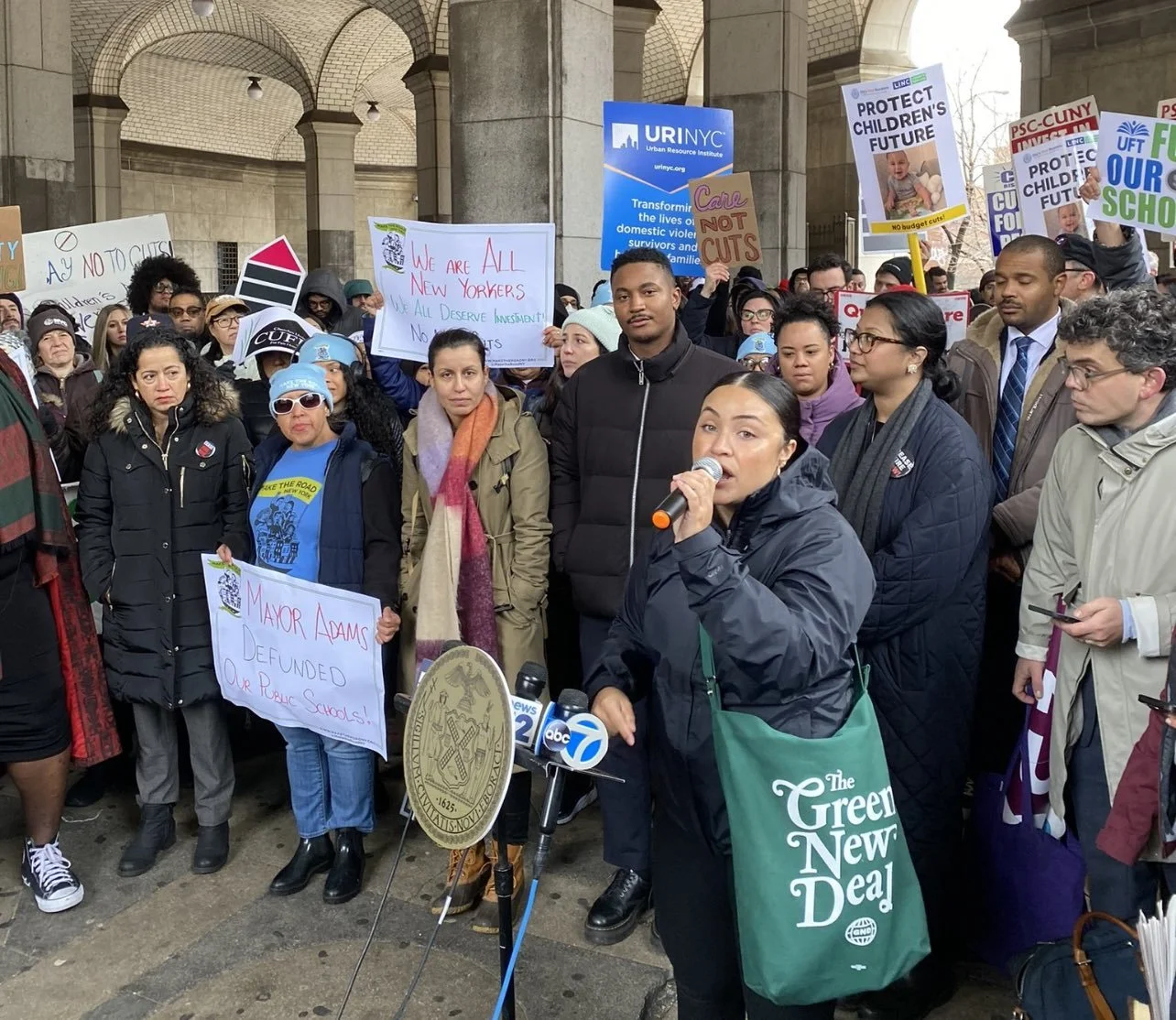Council rails against Adams’ budget cuts
/The New York City Council, led by Speaker Adrienne Adams and Finance Chair Justin Brannan, pushed back on Mayor Eric Adams and his administration’s budget cuts amid the asylum seeker crisis. Photo by Gerardo Romo/NYC Council Media Unit
By Ryan Schwach
The New York City Council is pushing back on Mayor Eric Adams’ recent budget cuts to libraries, education, police and other agencies, arguing that their own projections show that new revenue can stave off the cuts.
On Monday, a packed house of councilmembers grilled the mayor’s Office of Management and Budget over the administration’s cuts. Just before the hearing, the legislative body’s Progressive Caucus rallied against the budget decisions amid the council’s own report pointing to $1.2 billion in new revenue that could make up for the proposed cuts.
The lawmakers said on Monday that the cuts, which Adams announced in mid-November as the result of a deficit he claims has been caused by the asylum seeker crisis and the end of COVID stimulus dollars, will harm New Yorkers unnecessarily.
But while the mayor has said little else can be done but make the budget cuts, councilmembers pushed back on Monday and said that the money can be found to fill the gaps, which they say were created in part by the administration's own actions.
“I don't think there's a discrepancy as far as the gap is concerned, it's the way to close the gap that we're trying to get to a more reasonable way to do that,” Council Speaker and Queens delegation member Adrienne Adams said at Monday’s hearing. “Why does the administration rely solely on broad cuts to agencies in its approach to budgeting rather than pursuing a more balanced solution?”
The speaker along with Finance Committee Chair Justin Brannan published a report on Sunday which predicts, despite a general decline, that there will be an additional $1.2 billion in tax revenue coming the city’s way that could help fill in the budget gap.
“Despite the resilience and durability of our economy, signs of expected slower growth will present fiscal challenges to closing gaps in the coming years’ budgets, the Council’s economists, who have consistently provided realistic forecasts, still project $1.2 billion more in FY 2024 revenue than the Mayor’s budget office, leaving room for flexibility to avert some cuts when paired with the $1.45 billion of in-year reserves,” Adams and Brannan said in a joint statement.
“To close budget gaps in the years ahead, it is imperative that the City takes a different approach that prioritizes its investments in essential services, rather than making overly broad cuts, and seeks additional revenue to protect critical programs that support the health of New Yorkers,” they added. “Our city’s economy will rebound from this challenging period, but it will require strategic and responsible management to ensure New Yorkers persevere without being harmed.”
The electeds’ report claimed that the difference in the predictions is driven mainly by stronger personal income, property, business and sales taxes.
Councilmembers opposed the mayor’s assertions that the increased spending on the asylum seekers crisis over the last year was the sole reason for the city’s budgetary difficulties, and also questioned the administration’s financial management of that crisis.
“It is inaccurate and careless and sometimes dangerous to infer that our current financial circumstances are solely the result of increased costs from the asylum seeker response,” Brannan said during the hearing. “The council has sounded warnings before that the funding of permanent city services with temporary, time-limited COVID relief funds was problematic and stressed the need to locate other sources of funding to guarantee the continuation of these crucial services once those COVID funds expired.”
Speaker Adams and other members specifically questioned the city’s management of funds in dealing with the migrant crisis over the course of Monday’s lengthy hearing.
The speaker questioned why the lion’s share of asylum seeker spending in fiscal year 2024 went to New York City Health + Hospitals, and whether or not nonprofits should have been more widely considered for taking up some of the responsibility.
“Why are we subsidizing H + H's budget, leaving less funds for the provision of services to asylum seekers?” Adams asked OMB officials, who responded that H + H had the most infrastructure for managing the housing of migrants.
Nonprofits, who the councilmembers believe will be harmed by some of the city’s cuts, could be eligible for some of the contracts related to the asylum seeker crisis at a cheaper cost to the city, the councilmembers argued.
“I know you said that the community-based nonprofits and our city do not have the capacity to take care of all of these contracts, I do not agree,” said Manhattan Councilmember Gale Brewer. “I want to know why so many of these awards were given to for-profit companies.”
“Nonprofits are getting killed by the budget cuts,” Brewer added. “One way to survive to keep them whole would have been to help them work on this project.”
Councilemembers also heavily questioned the cuts from the perspective of their potential consequences to education, public health and public safety.
“We are all here because we are being impacted by these [cuts] that you have made across the board,” said Queens Councilmember Julie Won. “These are real people's lives.”
The loudest and most emphatic push back to the mayor’s cuts came just before the hearing on Monday, where members of the council’s Progressive Caucus rallied with community leaders against the cuts and the mayor.
“Shame on Mayor Adams for making war on working class New Yorkers,” said Queens Councilmember Tiffany Cabán. “We're not going to stop until we stop the bleeding because we're cutting into the bone at this point.”
The City Council’s Progressive Caucus rallied outside City Hall on Monday to oppose the Adams administration’s recent budget cuts. Photo by Urban Resource Institute/Twitter
Progressive councilmembers argued that the cuts would create harmful consequences for working class New Yorkers who struggle with child care and educational needs. They also chose to aim the blame for the deficit at Adams himself.
“When needs are up, when revenue is up, you cannot cut your way to prosperity,” said Queens Couuncilmember Shekar Krishnan. “You invest in the services that especially our most vulnerable going from New Yorkers depend on.”
“It is a manufactured crisis of austerity,” Krishnan added. “What we really have is a crisis of leadership.”
Regardless of the pushback from members of the council, OMB officials defended the cuts on Monday.
“We wish there was a less painful way to fund this national humanitarian crisis given that we must adhere to the city's right to shelter mandate and we are not getting adequate financial assistance from the federal government and from the state,” said budget director Jacques Jiha.





